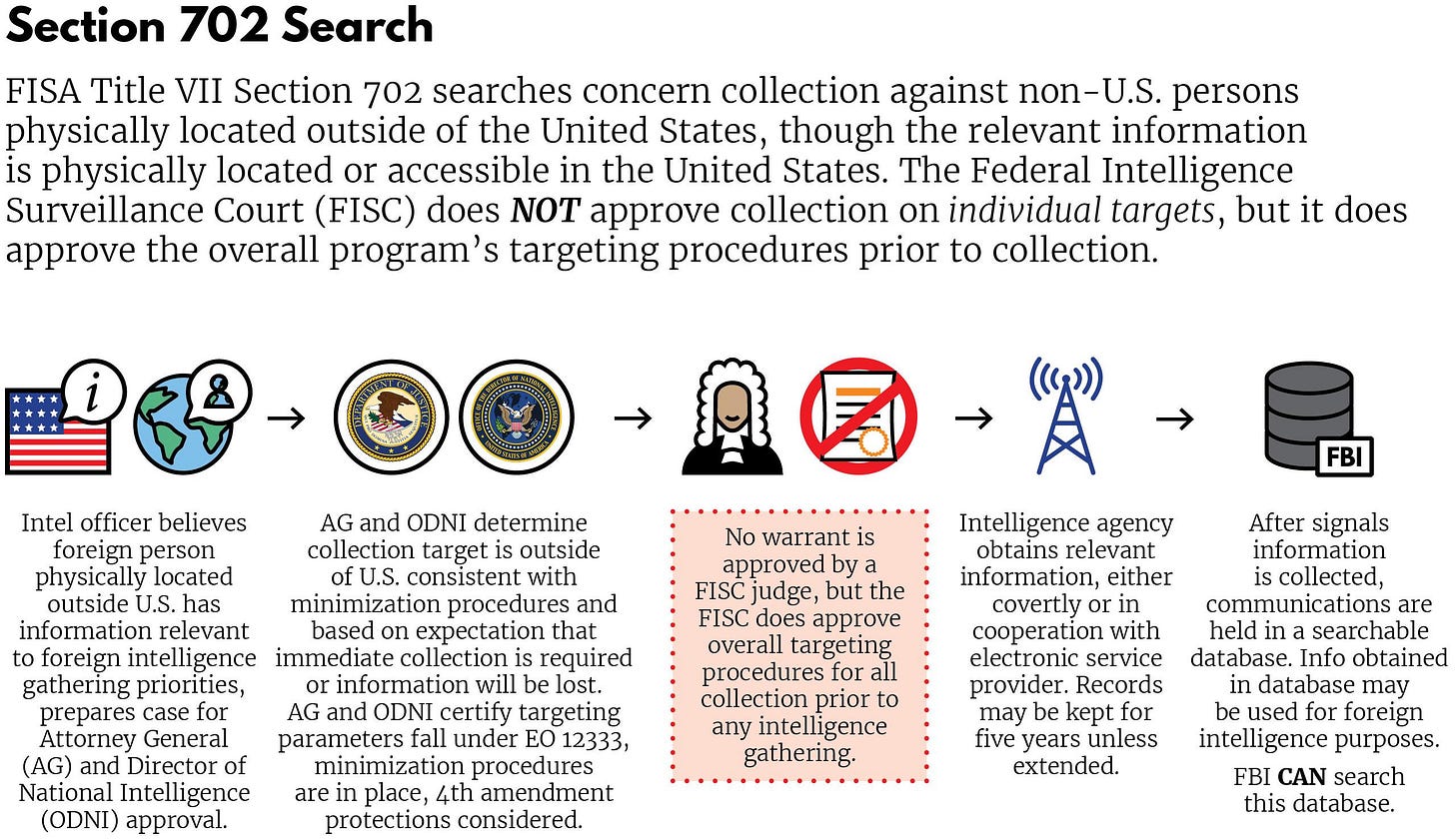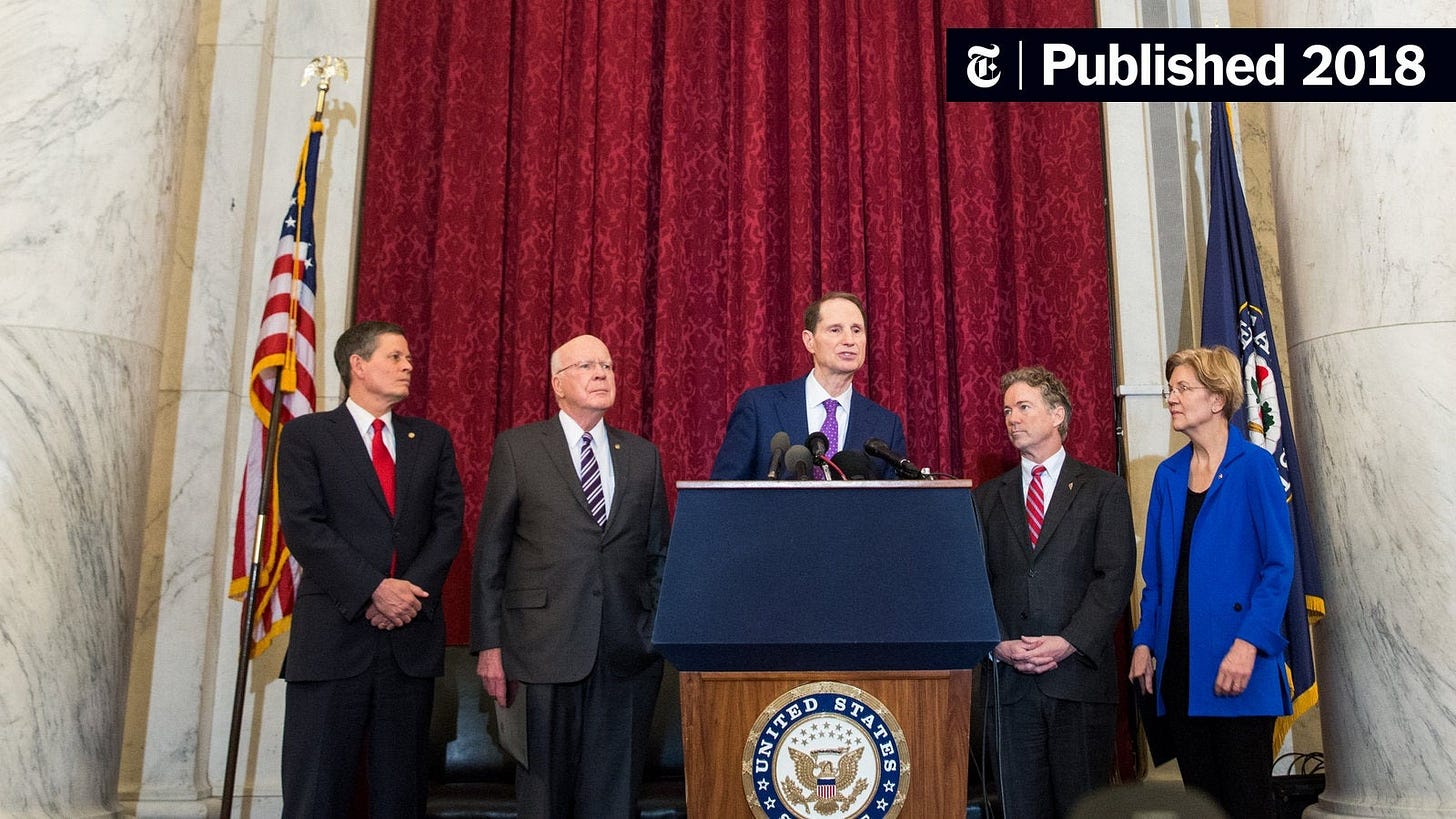The infamous September 11th terrorist attack in NYC has left many families and related victims with a legacy of terrible memories that are understandably evoked every year on that date. The attack was catastrophic and shocking, causing many Americans to suddenly revise their notions of our national security.
Another legacy is a series of restrictions placed on the personal freedoms of Americans. These constraints often circumvented basic constitutional norms, for they were enacted by a Congress that urged to act quickly to target the perpetrators of the attack. These congressional actions, acknowledged to be extreme, were deemed necessary, and (no worries!) temporary.
Like most ‘temporary’ congressional actions, these modifications to the law had expiration dates. One such temporary modification is Section 702 of the Foreign Intelligence Service Act (FISA), and it affects everyone who carries a mobile phone or uses email.
Section 702 allows the FBI to conduct surveillance on foreign nationals without obtaining a search warrant. This might not seem disturbing to most Americans, because the targeted phone calls and texts involve foreigners. But these calls and texts often involve Americans using phones here in America, communicating with someone outside our country. This is acceptable under section 702 provisions.
The ACLU and others have pointed out that Section 702 amounts to an easily accessed ‘back door’ to calls made by or to Americans, and that these US citizens were being recorded without a warrant. The “Office of the Director of National Intelligence” (yes there is such a thing) has reviewed the FBI’s use of Section 702. They found repeated violations of the law where the agency collected personal information on us illegally.
The FBI’s response, each time, has been to make modifications to their actions, so that they can keep using this ‘temporary’ law. Clearly, the agency wants to retain the ability to easily obtain information on any American whenever they wish. This is a long-standing tradition stems from the earliest days of the FBI, when Edgar Hoover famously and repeatedly conducted illegal surveillance on Americans he personally considered subversive. This was a very long list that included Martin Luther King Jr., Elenore Roosevelt, Malcom X, John F. Kennedy, John Lennon, even Abbot and Costello! J. Edgar spied on the Supreme Court, and even Tricky Dick feared him.
Lately the FBI ran afoul of the law by searching a foreign-intelligence database to spy on a US senator. In 2022 the agency searched the senator’s name no less than four separate times. The specific problem was that while the law technically justified the searches, the methodology broke the law by being overly broad (in other words, pulling in personal data that was unwarranted).
Congressman Jim Jordon, chair of the house Judiciary Committee, has pointed out that the FBI has used Section 702 to search American personal databases over 200,000 times in a single year. Despite these abuses, the Biden administration is asking congress to once again renew this mechanism of rights violations. This would be the second extension of a 2008 law that ‘expired’ in 2018, was extended, and at last is set to end at the end of 2023.
The administration has a long list of reasons why they consider Section 702 to be indispensable. Among its magical, ‘vital’ reasons for perpetuation include fighting terrorism, thwarting cyberattacks, and collecting information on China and Russia. They have even stated that the section is needed to combat the distribution of fentanyl. So, if a few thousand Americans have their privacy rights violated in the process, that would just be collateral damage.
The congressional panel overseeing the Section 702 renewal request is considering changes to the law, rather than allowing it to expire. They have expressed several concerns about the constant abuses by the FBI, including reported searches of Black Lives Matter members. But making modifications is only a band-aid on a section of law that should no longer exist.
When congress modifies the law with a temporary rule, it does so, presumably, for a reason. Unfortunately, this reason is often an admission that the law has been modified in a way that restricts personal freedoms. Such restrictions, while undesirable, are somehow still deemed necessary. Making the change ‘temporary’ makes it seem that the congress actually cares about the Constitution and regrets the need to ignore portions of existing law in the name of National Security.
When these changes are constantly renewed, it displays the lazy and shallow thinking that takes place among our elected representatives. The fact is, if a law needs to be changed, then that change should be publicly debated, defended by congressional advocates, and then incorporated into law legally and permanently. Pretending that a law is temporary, but almost automatically renewing it, is simply the shirking of congressional duty.
The last time Section 702 was renewed was in 2018. It barely passed renewal, because so many members of congress raised concerns about the constant abuse of the law.
Section 702 should have expired at the end of December but has gained a temporary reprieve. Many of us would love to see it fade away. Some members of congress have proposed various modifications to the law, including the constitutionally mandated warrants to invade the privacy of American citizens. But supporters claim that warrants are unneeded when national security is involved.
Bizarrely, some backers of renewal have suggested that in lieu of warrants, that the FBI goes to court to obtain what they call After-the-Fact-Approval. This surely must qualify as the Congressional Orwellian Terms of the Year.
As of this writing, Section 702 will not be fully renewed, nor will it be ended. In true Congressional avoidance of responsibility, it has been “extended”. This means that the law would not exactly die, but live on for a few months, so that Congress can enjoy their holidays without the annoyance of affixing their name to a law that has demonstrably and illegally invaded the personal privacy of their constituents. The renewal occurred, as usual, because 702 was inserted into an omnibus bill. We have written before about the dangers inherent in such legislation.
This “Life Support” extension enables Section 702 to limp along until April. At that time, Congress would have to go through the decision process all over again. National Security officials have maintained that this law is essential for the protection of national security. Yet these same bureaucrats have refused to produce evidence of this need because, “it’s a secret!”
This law should not be renewed in April. At the very least, the ability to spy on Americans without use of a warrant should be removed. The extra time allotted provides an opportunity for congress to make changes to a very bad law.
If no one is congress is willing to defend the privacy rights of Americans, what is there to be done? Here’s an imaginary secenario: what if a presidential incumbent with terrible poll numbers decided to help his reelection chances by vetoing a bill that Congress is unwilling to act on? It is certainly possibly, but as we say, strictly imaginary.
Reform Congress is a collaboration between Liz Terwilliger and Stephen Wahrhaftig.






